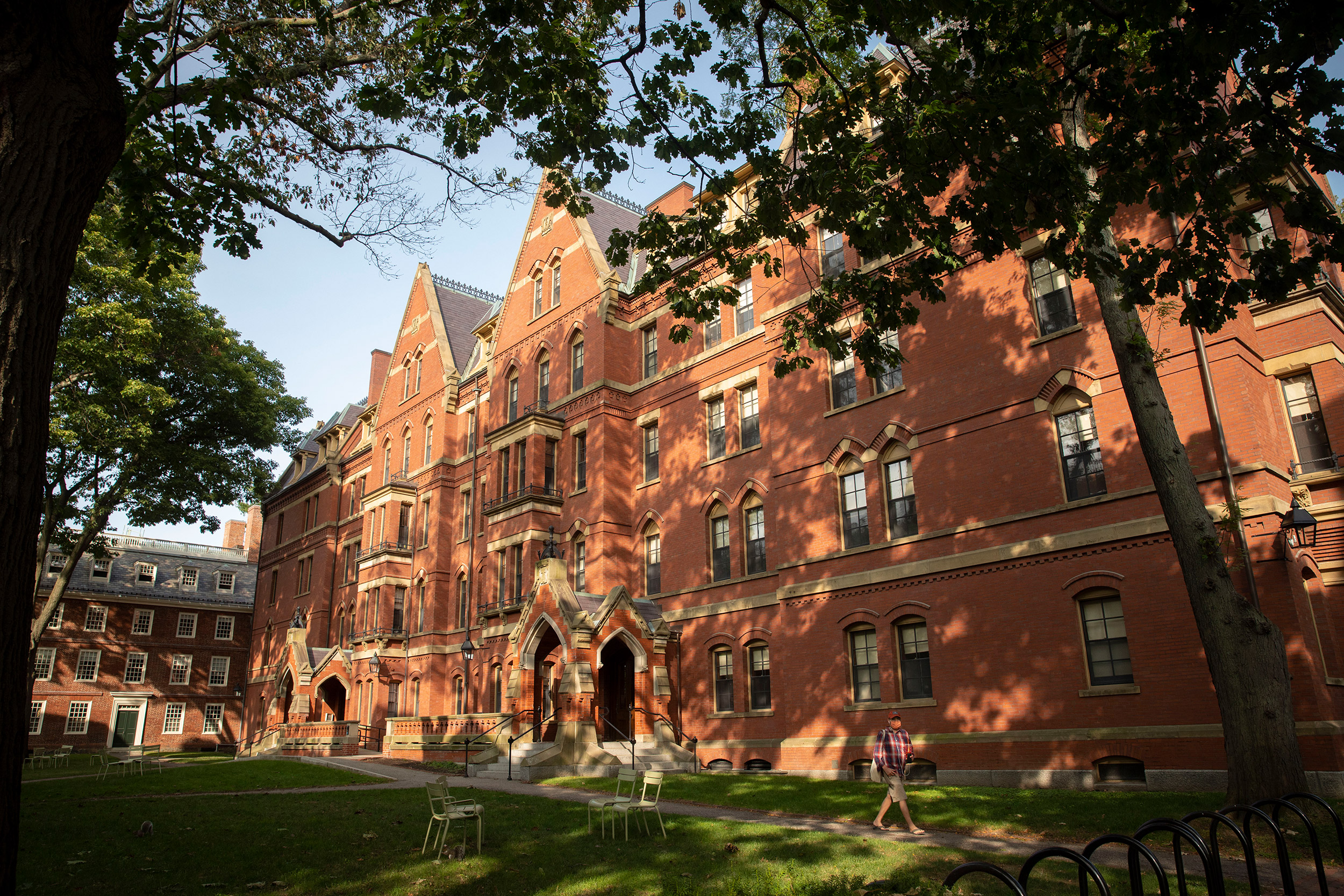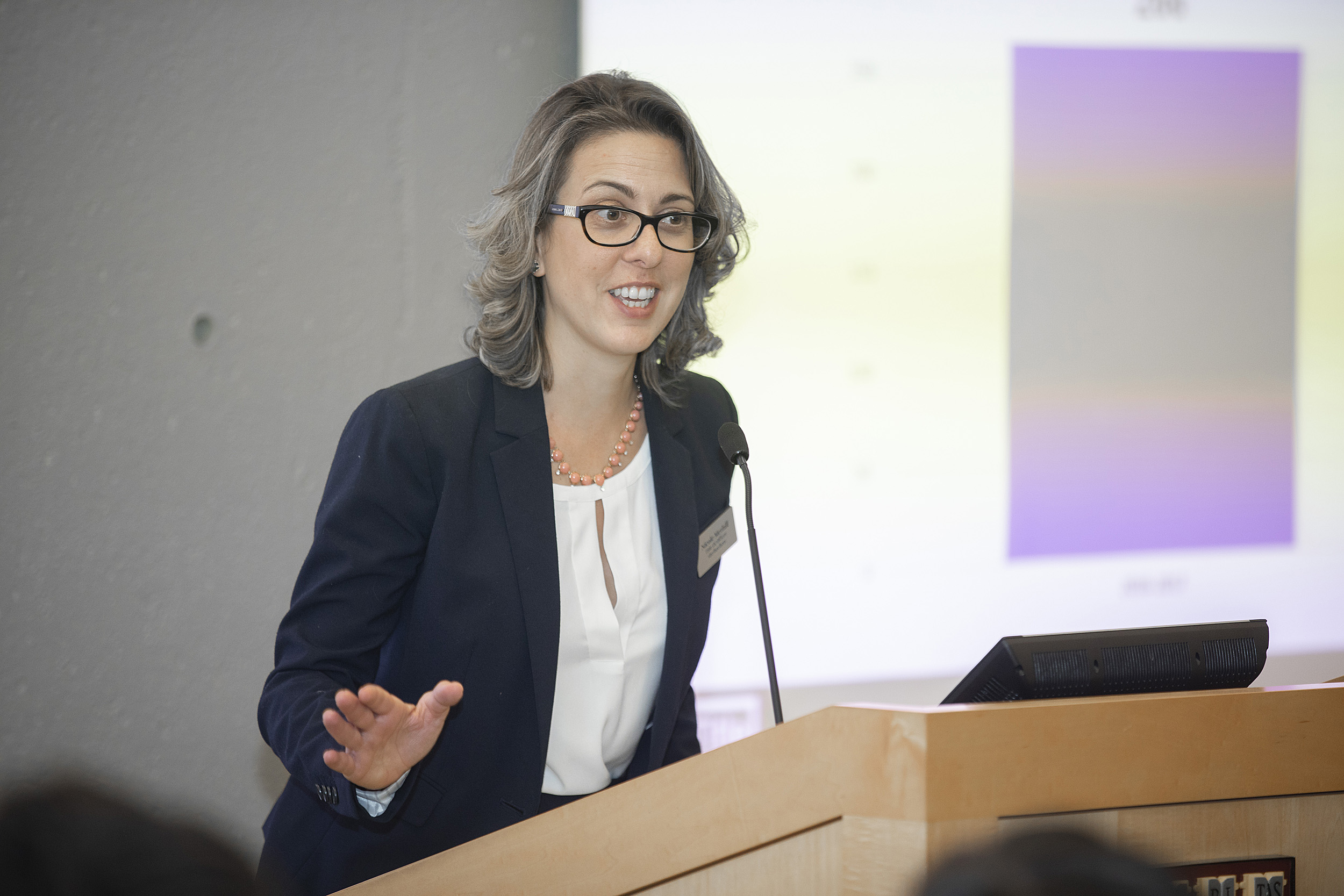
Harvard Yard.
Kris Snibbe/Harvard file photo
Harvard creates Office for Gender Equity
New unit, to be led by Nicole Merhill, merges OSAPR and Title IX Office
Harvard will form a new Office for Gender Equity, which will bring together existing resources previously housed within the Office of Sexual Assault Prevention and Response (OSAPR) and the Title IX Office, Provost Alan Garber announced today in an email to the University community.
The Gazette spoke with the director of the new office, Nicole Merhill, who is also Harvard’s Title IX coordinator, and Maria Francesconi, the senior director of Nursing and Health Promotion, to learn more about the community conversations and data analyses that led to the decision to unite OSAPR and Title IX, as well as what services and resources will be available to Harvard community members once the new office is fully operational later this summer.
Q&A
Nicole Merhill and Maria Francesconi
GAZETTE: What is the new Office for Gender Equity, and how was it formed?
MERHILL: The decision to bring together OSAPR with Title IX to create the Office for Gender Equity, which will report to the Office of the President and the Provost, was based on significant analysis of both data and service delivery, and on conversations with an array of community members and groups across Harvard.
The Title IX Office and Harvard University Health Services (HUHS), which has overseen OSAPR, have been hosting a series of conversations over the past few months with students, faculty, postdocs, and staff about how the University can better meet the needs of community members around issues of sexual assault/harassment and other sexual misconduct.
During these conversations, we explored themes that arose from the results of the Harvard 2019 AAU Student Survey on Sexual Assault & Misconduct, including a need to streamline access to resources, better communicate about the resources that are available, and expand on prevention efforts.
We also drew upon recommendations from the recently released report of the External Review Committee to Review Sexual Harassment that suggested the University should improve upon its communication and cohesion of access. Student groups such as Our Harvard Can Do Better, which we’ve met with frequently over the past year, have also expressed a need to reexamine the resources offered within the University and pointed to potentially centralizing resources for community members within one office.
GAZETTE: What else did you hear in these recent community conversations about what was most important to people?
FRANCESCONI: Students, postdocs, staff, and faculty alike spent significant time reflecting on existing services, what has worked well from both offices, and where our opportunities are for improvement in our service throughout the community. They highlighted the importance of high-quality and easily accessible crisis counseling and other supportive measures, and the continued expansion of prevention work, including increased opportunities for bystander intervention programming. We also heard that the Title IX Office’s recently launched Resource for Online Anonymous Disclosure (ROAD) online reporting tool was very important to our community members and that collaborative educational initiatives that touched on the work of both Title IX and OSAPR were particularly insightful.
GAZETTE: What are you most hopeful about, in terms of new opportunities for Title IX and OSAPR to exist as one office?
FRANCESCONI: Certainly, having all of our resources centrally located will make it easier for community members to access the information, and the support, that they need. The Office for Gender Equity will be implementing an innovative public health approach to the existing shared mission of OSAPR and Title IX, and it will bring together the strengths of both existing offices in more cohesive ways. Working together, we will be able to more effectively share best practices, diverse areas of expertise, and perspectives, which will serve our commitment to find new ways to connect with, and support, our community.
GAZETTE: What services will the office provide once it’s established?
Nicole Merhill speaking at a 2018 event.
Kris Snibbe/Harvard Staff Photographer

MERHILL: The office will serve as a centralized resource for prevention and education initiatives; direct crisis counseling; psychoeducation group therapy and other restorative practices following experiences of harm; incident disclosure to the University, and anonymous disclosure; and for filing a formal complaint. These resources will be available to undergraduate and graduate students, postdocs, faculty, and staff alike.
GAZETTE: Can you provide some more specifics about what the education and prevention resources will look like?
MERHILL: Absolutely. In terms of prevention and education, the office will offer workshops ranging from gender diversity and inclusion, to consent education, to bystander intervention and more. This will represent enhanced and expanded programming beyond what OSAPR and Title IX have offered in the past.
GAZETTE: And crisis counseling resources?
MERHILL: Direct crisis counseling will continue to be available to Harvard community members. These services will be offered through SHARE (Sexual Harassment/Assault Resource Education) counselors, who will provide support to individuals impacted by interpersonal violence and abuse, including sexual harassment, sexual assault, dating violence, and stalking. SHARE counselors will also maintain a 24-hour crisis hotline, which can be reached by calling 617.495.9100.
While individuals may choose to access the hotline anonymously, it is important to note that all communications with SHARE counselors, whether in person or via the hotline, are confidential, meaning absent special circumstances required by law, information shared during these conversations will not be communicated beyond SHARE staff members and the direct clinical support provided by HUHS without the individual’s consent.
A repeated theme through our many conversations with community members was the need for dedicated resources with expertise in restorative practices as well as experience working directly with individuals who may have caused harm within our community. In response to this need, we will be hiring a SHARE counselor and restorative practitioner dedicated to this area of expertise. The search process for filling this position will start immediately.
GAZETTE: And how can people make a disclosure, or file a formal complaint, under the new structure?
“Working together, we will be able to more effectively share best practices, diverse areas of expertise, and perspectives, which will serve our commitment to find new ways to connect with, and support, our community.”
Maria Francesconi
MERHILL: Right now, community members can use the very same contact information in place for OSAPR and Title IX, while we work with students, staff, faculty members, and postdocs to develop one centralized website dedicated to the Office for Gender Equity. As part of the new website, individuals will be able to explore and connect with each of the available resources and examine available data pertaining to disclosures, formal complaints, and programming, through a centralized data hub. We will look for community input as we navigate the process for developing the website, as it is essential that the new website is accessible and approachable.
The new Office for Gender Equity will also support and work closely with the network of over 50 local Title IX resource coordinators University-wide, who have specialized experience in responding to disclosures and can help individuals navigate the next steps. This includes helping individuals access supportive measures such as counseling, extensions of deadlines or other course-related adjustments, modifications of work or class schedules, campus escort services, no-contact orders, changes in work or housing locations, leaves of absence, increased security, or monitoring.
We recognize that not all individuals will feel comfortable reaching out directly to the Office for Gender Equity. Individuals may raise a concern anonymously to Title IX staff through the Resource for Online Anonymous Disclosures, or ROAD. The role of the ROAD is to provide Harvard community members with an online tool to anonymously disclose concerns of sexual harassment or other sexual misconduct. This online form is hosted by an independent, third-party vendor who provides secure, anonymous reporting services. Those who choose to submit a concern through the ROAD may share as much or as little information as they feel comfortable with. Sharing a concern through the ROAD is not the same thing as filing a formal complaint.
Lastly, community members may choose to engage with the Office for Gender Equity because they wish to file a formal complaint. Individuals may file a formal complaint alleging a violation of the University policies by submitting the complaint to the University Title IX coordinator at oge@harvard.edu. Formal complaints will continue to be investigated by the professional investigators within the Office for Dispute Resolution (ODR). It is also important to know that ODR remains available as a resource for community members seeking information or advice regarding the formal complaint process and informal resolution.
GAZETTE: When can Harvard community members expect to see the new Office for Gender Equity in place and actively serving the University?
FRANCESCONI: We are planning to fully transition to the new office this summer, and over the next several months we will begin to lay the groundwork for its opening. Rest assured, throughout this process, we will continue to offer services within the existing University Title IX Office and OSAPR spaces.
You will see later today, as a key first step in this process, the posting of two positions for SHARE counselors, one of which, as previously mentioned, will include recruitment for someone with a background in restorative practices. Staff and faculty will be introduced to the new office via a required eLearning Course, which will be assigned to all benefits-eligible employees in early April, as we kick off Sexual Assault Awareness Month (SAAM). Of course, with a new office also comes a new group of people working together. Over the next few months, we will also begin to establish our working relationships with new colleagues.
The Office for Gender Equity will continue to host a series of community conversations throughout April and May. We invite you to join these conversations, as well as a series of events planned for SAAM, and we invite you to partner with us as we build this new and critically important office on campus.
We are grateful to the many students, faculty, and staff who have lent their perspectives to the process of establishing the Office for Gender Equity at Harvard, and we look to all of you to continue to provide us with feedback and ideas as to how we can most effectively support our community, moving forward.




